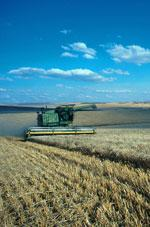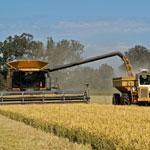What is Agronomy?
-
Agronomy is the application of science and technology from the fields of biology, chemistry, economics, ecology, soil science, water science, pest management and genetics to the improvement and management of the major food crops of the world.

- Agronomy is differentiated from the plant sciences of horticulture, pomology, range science, and other applied plant sciences by the specific crops considered and the scope. Agronomic crops are those that occupy large acreage, and are the bases of the world’s food and fiber production systems, often mechanized. Examples are wheat, rice, corn, soybean, alfalfa and forage crops, beans, sugar beets, canola, and cotton. Also called ‘field crops’, these crops typically consist of a large majority of a country’s agricultural acreage and crop revenue.
- Agronomy is a science that looks at agriculture from an integrated, holistic perspective, informing practical decisions pertaining to food and fiber production.
- Agronomy considers the whole range of influences on crop production, including climate and adaptation, soil, water and water availability, crop genetics, the properties of the soil and how the soil interacts with the growing crop; what nutrients the crop needs; the ways
that crops grow and develop; and how best to control weeds, insects, fungi, and other crop pests. Non-biological considerations such as economic requirements and consumer and farmer behavior also inform agronomic practices, as do environmental constraints.

- Agronomy as a science considers how to grow crops effectively and profitably while conserving natural resources and protecting the environment.
- Agronomy requires integration of many sciences, and collaborations among many diverse fields, including soil, plant, and weed sciences, as well as the disciplines such as ecology, entomology, climatology, and economics. Effective crop production methods are grounded in scientific research and thus are by nature continually evolving and improving.
Learn More about Agronomy!
What is an Agronomist?
- Agronomists are plant and soil scientists who develop innovative farm practices and technologies to boost crop yields, improve farm profitability and sustainability, and protect the environment.
- Agronomists often specialize in areas such as irrigation/water science, soil fertility, plant breeding, plant physiology, crop management, economics, and pest control, but have the capability of addressing and integrating all of the multiple areas impacting crop production.
- Agronomists can also serve as professional practitioners, educators, and advisers who work directly with farmers, companies, and others in the agricultural community to implement the latest methods and tools for growing crops profitably and sustainably.
- Agronomists also play critical roles in issues of global concern, including food and water security, air quality and climate change, soil and water conservation, rural communities and economic growth, health and nutrition, wildlife habitat in agriculture and many other areas of public concern.
- Agronomists feed the world.
